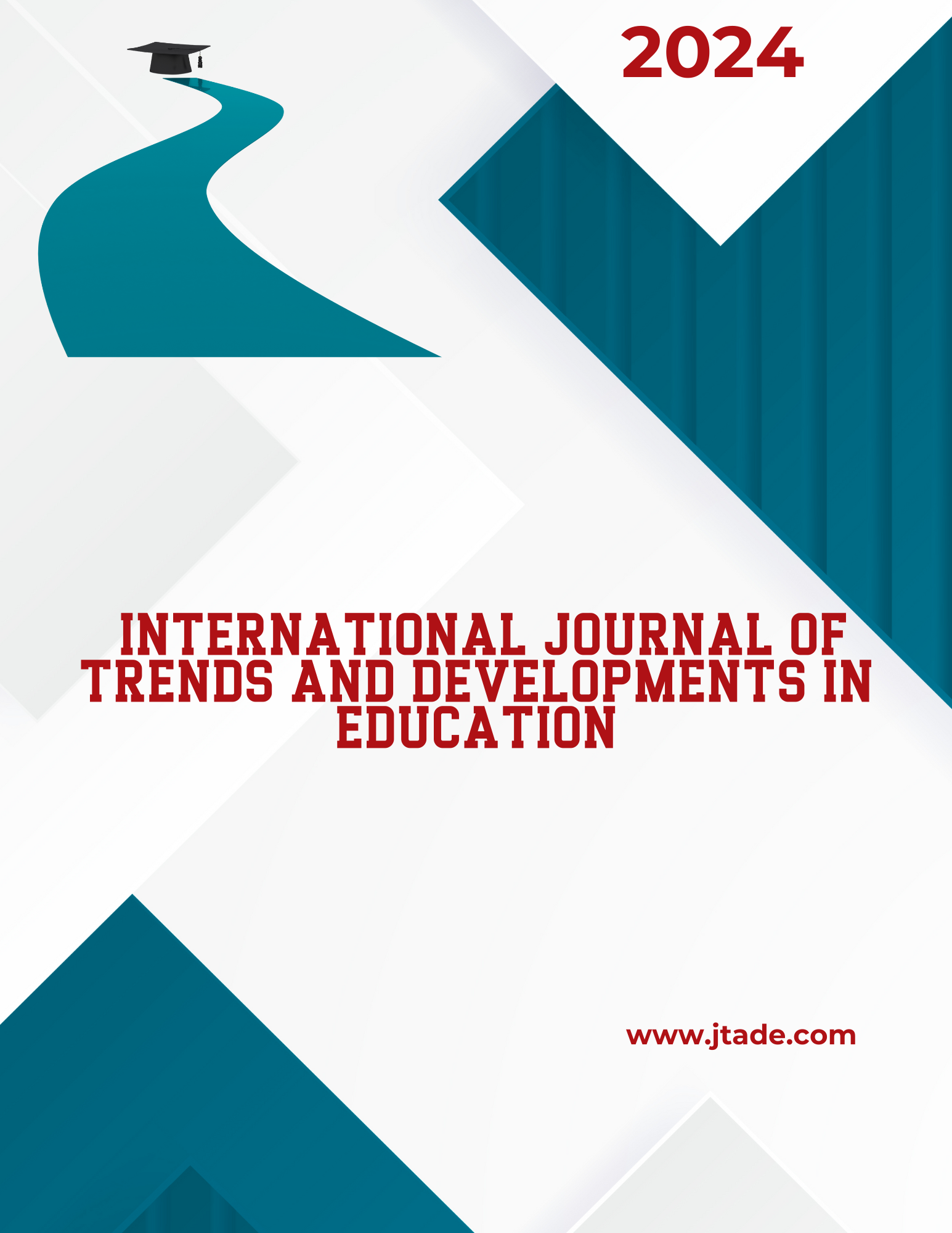Research article | Open Access
International Journal of Trends and Developments in Education 2023, Vol. 3(2) 40-51
The 2023 Education Vision Document/Reform A Review of the Literature
pp. 40 - 51
Publish Date: December 31, 2023 | Single/Total View: 78/119 | Single/Total Download: 88/131
Abstract
The purpose of this study is to systematically examine the academic studies conducted on the 2023 Education Vision, which was launched by the Ministry of National Education. It is aimed to analyze and draw conclusions about the articles and theses written on the 2023 Education Vision according to their objectives, working groups, results, and suggestions. The focus of the research is how the 2023 Education Vision is seen by the stakeholders of education, to what extent it is owned, and what kind of contributions it will make. Data was collected and examined by browsing the articles and theses on the 'Google Scholar', 'Yök Tez', and 'Dergipark' websites. In this study, a systematic compilation method was used, and a document analysis was applied as a research design. The articles and theses identified on the subject were examined from 4 perspectives: the method used in the studies, the working groups of the research, the interview questions used, and the results and suggestions of the studies; the findings were interpreted accordingly.
According to the review results, despite the excitement that the Education Vision for 2023 initially sparked among stakeholders, the negative experiences gained from previous educational models, the fact that stakeholders were not included in the process of creating the vision document, and concerns that the goals will take a long time to achieve, have all contributed to a less optimistic outlook. According to the study, there is a negative perception about the vision which is further strengthened. Furthermore, as the professional seniority and educational level increases, the positive perception of the vision decreases in western cities. To achieve the 2023 Education Vision, the study suggests improving the physical facilities of schools, prioritizing teacher training and development, and eliminating the educational gap between schools and cities.
Keywords: Mission, Reform, Vision
APA 7th edition
Taylan, A., Turan, N., Karakus, E., & Raslan, I. (2023). The 2023 Education Vision Document/Reform A Review of the Literature. International Journal of Trends and Developments in Education, 3(2), 40-51.
Harvard
Taylan, A., Turan, N., Karakus, E. and Raslan, I. (2023). The 2023 Education Vision Document/Reform A Review of the Literature. International Journal of Trends and Developments in Education, 3(2), pp. 40-51.
Chicago 16th edition
Taylan, Ahmet, Neytullah Turan, Erdogan Karakus and Ibrahim Raslan (2023). "The 2023 Education Vision Document/Reform A Review of the Literature". International Journal of Trends and Developments in Education 3 (2):40-51.
Akgün, E. (2019). Educational Data Mining in the 2023 Education Vision. Seta(Foundation for Political, Economic and Research)/Perspektif, January, Issue: 228. https://www.setav.org/perspektif-2023-egitim-vizyonunda-egitsel-veri-madenciligi/
Aktan, C.C. (1999). Strategic Management in the 2000s. Tügiad Publication, Istanbul.
Aktay, S. , Gülay, E. & Selvi, C. (2020). 2023 Education Vision and Classroom Teacher Candidates. International Primary Education Research Journal, 4 (1), 1-11. Retrieved from https://dergipark.org.tr/tr/pub/iperj/issue/58845/687302
Arkan, A. & Öztürk, N. (2018). Early Childhood Education in the 2023 Education Vision. Seta(Foundation for Political, Economic and Research)/Perspektif, January, Issue: 218, November.
Aydin, N. (2018). QUALITATIVE RESEARCH METHODS: ETHNOLOGY. International Journal of Humanities and Social Sciences Review, 2 (2), 60-71. Retrieved from https://dergipark.org.tr/en/pub/ihssr/issue/36852/425401
Bailey, K. D. (1982). Methods of Social Research. New York: Free Press.
Barca, M., & Balcı, A. (2006). How can public policies be approached strategically? Public Administration Journal, 39(2), 29-51.
Bowen, G. A. (2009). Document Analysis as a Qualitative Research Method. Qualitative research Journal, 9(2), 27-40. https://doi.org/10.3316/QRJ0902027
Burns, N., & Grove, S. K. (2007). Understanding Nursing Research: Building an Evidence-Based Practice. (4th ed., pp. 134-163). Saunders Elsevier, St. Louis.
Centre for Reviews and Dissemination. (2008). Systematic Reviews: CRD’s Guidance For Undertaking Reviews In Health Care. University of York, 2008 Published by CRD, University of York: York Publishing Services Ltd, ISBN 978-1-900640-47-3
Corbetta, P. (2003). Social research: Theory, Methods and Techniques. Thousand Oaks: Sage Publications, London.
Doğan, S. (2019). School Administrators and Teachers' Opinions on the 2023 Education Vision Document. Cumhuriyet International Education Journal, 8(2), 571-592. http://dx.doi.org/10.30703/cije.550345
Duran E. & Kurt, M. (2019). Teachers' Views on 2023 Education Vision, International Journal of New Approaches in Social Studies, 3(1), 90-106, June. Retrieved from https://dergipark.org.tr/tr/pub/sbyy/issue/46969/586351
Erdogan, I. (2015). Change Management in Education. Ankara: Pegem Akademi.
Ertürk, A. (2020). 2023 Education Vision: A Solution to the Problems? Pamukkale University Faculty of Education Journal (PAU Journal of Education 48: 321-345. https://doi.org/10.9779/pauefd.537273
Hemingway, P. and Brereton, N. (2009) What Is a Systematic Review? Hayward Medical Communications, 2, 1-8. http://www.whatisseries.co.uk/
Higgins, J. P. T., & Green, S. (Eds). (March 2011). Cochrane Handbook for Systematic Reviews of Interventions. Version 5.1.0. Access: 30.06.2011. http://www.mrc-bsu.cam.ac.uk/ cochrane/ handbook/.
Karaca, I. & Karaca, N. (2021). Examination of 2023 Vision Document in Terms of Digitalization, National Education Academy Journal, 5 (1), 1-8 e- ISSN: 2636-7866. https://doi.org/10.32960/uead.855514
Kıral, B. & Çilek, A. (2020). Evaluation of 2023 Vision Document in Terms of Character Education, National Education. 49(225), 5-22. Retrieved from https://dergipark.org.tr/tr/pub/milliegitim/issue/52526/690588
Köç, A. & Ünal, O. (2018). Examination of Social Studies Teachers' Views on the 2023 Education Vision. Journal of Innovative Research in Social Studies, 1 (2), 65-79. Retrieved from https://dergipark.org.tr/en/pub/jirss/issue/41711/502356
MEB. (2018). 2023 Education Vision, https://tegm.meb.gov.tr/www/2023-vizyonu/icerik/23. Access date: 24.12.2021.
Mingat, A. & Tan, J.P. (2003). Tools for education policy analysis. Washington DC: World Bank.
Mirze, K. and Ülgen, H. (2004). Strategic Management in Businesses. Istanbul: Literature Publications.
Muslu, Ş. (2014). THE IMPORTANCE OF MISSION AND VISION CONCEPTS IN ORGANIZATIONS. Hak İş International Journal of Labor and Society, 3 (5), 150-171. Retrieved from https://dergipark.org.tr/tr/pub/hakisderg/issue/7577/99505
Ramazanoğlu, F. & Bahçeci, B. (2006). THE CONCEPT OF VISION AND MISSION IN ORGANIZATIONS. Fırat University Journal of Eastern Studies, 5 (1), 52-56. Retrieved from https://dergipark.org.tr/tr/pub/fudad/issue/47092/592360
Turkish Language Society. (1988). Turkish Dictionary, Turkish Historical Society Publishing House.
Yildirim, a. & Şimşek, H. (2016). Qualitative Research Methods in Social Sciences, Ankara: Seçkin Publishing.
